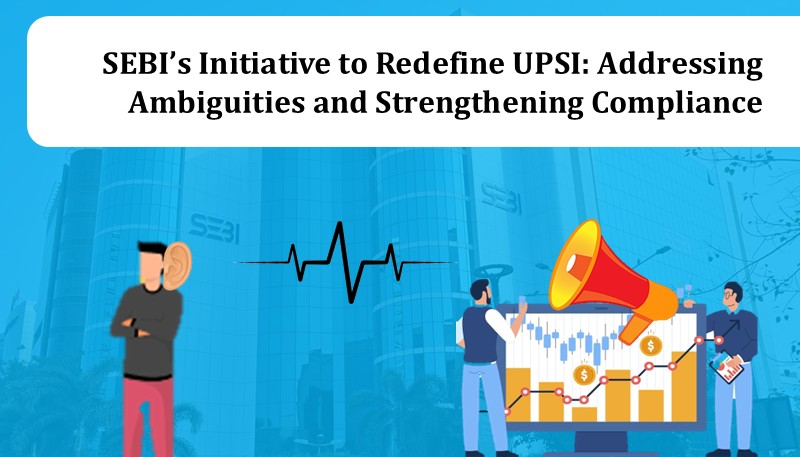The Securities and Exchange Board of India (“SEBI”) has released a [1]Consultation Paper which proposes a comprehensive review of the definition of Unpublished Price Sensitive Information (“UPSI”) under the SEBI (Prohibition of Insider Trading) Regulations, 2015 (“PIT Regulations”). The move stems from the need to align the definition of UPSI with material events specified in the SEBI (Listing Obligations and Disclosure Requirements) Regulations, 2015 (“LODR Regulations”). With this alignment, SEBI aims to address regulatory ambiguities, promote ease of doing business, and ensure timely and accurate disclosures to protect investor interests.
Currently, the definition of UPSI includes events like financial results, dividends, mergers, acquisitions and changes in key managerial personnel. However, a study by SEBI revealed that listed entities often interpret UPSI narrowly, covering only explicitly mentioned events, thus falling short of the regulatory intent. This approach has led to gaps in disclosures, inconsistencies in compliance, and an overall lack of clarity. Stakeholder feedback further highlighted concerns such as excessive compliance burdens, perpetual trading window closures, and ambiguities in interpreting material events. In response, SEBI’s working group reviewed the definition to align it with Schedule III (Disclosure of information having bearing on performance/operation of listed entity and/or price sensitive information) of the LODR Regulations, ensuring clarity and uniformity in compliance practices and promoting ease of doing business while upholding market integrity.
The Recommendations: Background and Need for Change
Changes in Ratings
One of the key changes proposed by SEBI is the inclusion of changes in credit ratings within the UPSI definition. While the existing definition partially addresses ratings under changes in capital structure, routine revalidations have led to confusion. SEBI proposes inclusion of only upward or downward revisions to ensure that only significant events impacting securities are disclosed. This measure strikes a balance between avoiding over-disclosure and safeguarding market integrity.
Fundraising Decisions
Another major change is the explicit inclusion of fundraising decisions as UPSI. Currently omitted, these decisions can significantly influence investor sentiment, affect shareholder value and market dynamics. By mandating the disclosure of fundraising plans, SEBI aims to enhance transparency and ensure timely updates about equity or debt offerings, empowering stakeholders with vital information.
Resignations of Key Managerial Personnel and Auditors
Resignations of key managerial personnel and auditors also feature prominently in the proposals. SEBI recommends including resignations beyond routine superannuation or term completions, particularly those stemming from governance issues. Statutory and secretarial auditors are also brought under this scope. These changes aim to bolster corporate governance by providing stakeholders with insights into critical changes in leadership.
Forensic Audits
SEBI further emphasizes the need to disclose forensic audits, particularly those related to fraud detection and misappropriations. Currently, these audits lack structured disclosure requirements. The proposal mandates disclosure at both initiation and conclusion stages, fostering investor confidence and reducing risks associated with corporate misconduct.
Regulatory and Judicial Actions
Regulatory and judicial actions, including insolvency proceedings and significant penalties, are inconsistently disclosed under the current framework. SEBI proposes their inclusion as UPSI to align with LODR provisions and ensure stakeholders are informed about critical developments. This will bring greater consistency in reporting significant events impacting listed entities.
Litigation and Material Contract Outcomes
The outcomes of litigation and changes to material contracts are also prioritized. SEBI proposes the mandatory disclosure of significant litigation outcomes, and any material changes to contracts that may impact a company’s financial or operational stability. This measure ensures clarity on risks affecting the entity and enhances investor decision-making.
Corporate Insolvency Resolution Process (CIRP)
CIRP often holds significant implications for shareholders and investors. SEBI proposes including CIRP-related events, such as NCLT admissions and their outcomes, within UPSI. By mandating timely updates on restructuring processes, SEBI aims to foster market confidence and support informed investment decisions.
Forensic Audit Alignment with SEBI FAQs
Another key change is the alignment of forensic audit disclosures with SEBI’s FAQs. By specifying the types of audits—those detecting misstatements, fund diversion, or fraud, SEBI seeks to eliminate ambiguity and streamline disclosure obligations. This alignment ensures consistency in interpreting regulatory requirements across entities.
Restructuring and One-Time Settlements
Loan restructuring and one-time settlements with financial institutions, often omitted under UPSI, are also proposed for inclusion. These events can significantly impact a company’s financial health. By mandating their disclosure, SEBI ensures that investors are informed about critical financial restructuring measures.
Licenses and Regulatory Approvals
Events related to licenses and regulatory approvals also receive attention in the proposals. SEBI recommends mandating the disclosure of granting, suspension, cancellation, or withdrawal of key licenses and approvals. This measure addresses potential operational risks and ensures stakeholders are aware of factors influencing the entity’s continuity.
Management and Control Agreements
Management and control agreements, which significantly impact a company’s governance, are also proposed for inclusion in UPSI. SEBI aims to ensure that any binding agreements affecting management or control, including amendments or rescissions, are disclosed to maintain corporate governance standards and transparency.
Guarantees and Indemnities
Additionally, SEBI seeks to capture financial risks posed by guarantees and indemnities that are not in the normal course of business. The proposal mandates the disclosure of such non-standard obligations, ensuring that stakeholders are aware of liabilities that could affect the company’s financial position.
Litigation and Dispute Outcomes
Lastly, SEBI emphasizes the need for consistency in disclosing litigation outcomes with financial or operational implications. By mandating such disclosures as UPSI, SEBI ensures transparency and uniformity in how entities report dispute outcomes that could affect their valuation or operations.
Conclusion
SEBI’s proposed amendments to the UPSI definition reflect its commitment to fostering transparency, reducing regulatory ambiguities, and promoting investor trust. By expanding the scope of UPSI and aligning it with LODR provisions, SEBI aims to create a robust compliance framework that balances regulatory oversight with operational flexibility. These changes, once finalized, will significantly reshape how listed entities approach disclosures and compliance, ensuring a more transparent and efficient market ecosystem.
[1] Source : SEBI Consultation Paper on proposed review of the definition of Unpublished Price Sensitive Information under SEBI (Prohibition of Insider Trading) Regulations, 2015 to bring regulatory clarity, certainty and uniformity of compliance in the ecosystem
To stay informed and prepared as these changes reshape compliance practices for listed entities, do get in touch with us. You can also directly reach out to getintouch@lexplosion.in
Written by: Dwaipayan Das
Co-authored by: Amiya Mukherjee
Disclaimer
This content is intended for informational purposes only and does not constitute a legal opinion. Despite our efforts to maintain accuracy, we do not make representations, warranties or undertakings regarding the quality, completeness or reliability of the content. Readers are encouraged to seek legal counsel prior to acting upon any of the information provided herein. This content, including the design, text, graphics, their selection and arrangement, is Copyright 2024, Lexplosion Solutions Private Limited or its licensors. ALL RIGHTS RESERVED, and all moral rights are asserted and reserved.
For any clarifications, please reach out to us at 91-33-40618083 or inquiries@lexplosion.in. Refer to our privacy policy by clicking here.





